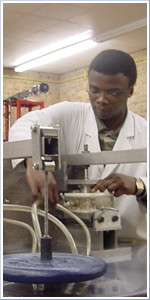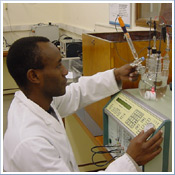| |||||||||||||||||||||||
|
|
- The degree
programme
- Funding
opportunities and deadlines
- How to apply
This degree is available to selected BSc graduates with a three-year
degree in chemistry, physics or geology. The aim is to provide BSc
graduates with one year of intensive training in Materials Science.
In addition the BSc (Hons) in Materials Science programme prepares
students for registration for research degrees in Materials Engineering
at the Masters and ultimately Doctoral levels.
|
|
![]()
Materials Engineering courses are designed to provide the student
with a knowledge of the principles involved in relating the mechanical
and physical properties to their structure and constitution.
Emphasis is given to the way in which structure may be controllecd to
allow the development of industrial materials, based upon advanced
design criteria.
The origins of specific physical and mechanical properties will be
traced to the variables involved in the process of manufacture.
The undergraduate Materials Engineering courses may be taken by
students in the B.Sc. Engineering programmes, and by students in some
BSc programmes. Consult your student advisor.
Postgraduate degree
programmes are offered to graduates with BSc and BSc(Eng) degrees.
|
|
![]()
The laboratory facilities within the Centre for
Materials Engineering enable full characterisation and testing of most
engineering materials. The laboratories are geared towards both
undergraduate teaching and advanced research at postgraduate and
post-doctoral levels.
The main facilities include:
-
Corrosion Testing
Heat Treatment
Mechanical Testing
Microscopy
Specimen Preparation
Thermal Analysis
Measurement of Thermophysical Properties
Wear Testing
Researchers at the Centre are also able to access
other facilities on UCT campus and designated regional facilities within
the Western Cape. These facilities include the Electron Microscope Unit
at UCT and the X-ray Diffraction system at the National Acceleration
Centre.
Specimen Preparation
The Centre has a modern, well-equipped laboratory for
the preparation of specimens for microstructural analysis. The Struers
Metalog system is employed, and grinding and polishing media are
maintained for the preparation of a broad spectrum of material types
that range from polymers to hard metals and wear resistant ceramics.
Facilities for the preparation of thin foil specimens for transmission
electron microscopy include a Struers Tenupol twin jet polisher and a
Gatan Precision Ion Polishing System (PIPS)..
Custom designed equipment and test specimens are
manufactured in a precision machine workshop that is housed within the
Centre.
Microscopy
The microscope suite includes a light microscope
laboratory and a Cambridge S200 scanning electron microscope equipped
with an energy dispersive x-ray analyser. The light microscope
laboratory is geared for incident and transmitted light microscopy. The
principal research microscope has a video camera attached for the
acquisition of high quality digital images.
The Centre also has access to a suite of electron
microscopes at the Electron Microscope Unit at UCT. This includes a JEOL
CX200 transmission electron microscope, a LEICA 440 analytic scanning
electron microscope and a Cambridge S200 scanning electron microscope.
An HKL Technology electron backscattered diffraction system for
microtexture examination and orientation mapping is attached to the
Cambridge S200 microscope.
Heat Treatment
The heat treatment facility includes a sophisticated
high vacuum/controlled atmosphere quenching furnace capable of
performing heat treatments up to 1400C. Various salt baths for
isothermal treatments are also available, as well as a number of muffler
furnaces capable of performing atmospheric heat treatments up to 1100C.
The Centre also has a Degussa high-pressure furnace for sintering
tungsten carbide hard metals.
Mechanical Testing
The mechanical testing facility has a 250/50kN
servo-hydraulic machine (ESH), a 200kN Zwick universal testing machine,
an impact testing machine capable of measuring both Izod and Charpy
fracture energies, and a 5kN Instron tension/compression tester. In
addition, there are several purpose built rigs that include an
instrumented drop-weight impact tester and a plane strain compression
rig for simulating rolling deformation of aluminium alloys.
Thermal Analysis
The Centre has a NETSCH STA400 thermal analyser that
is capable of performing simultaneous TG/DTA and TG/DSC analysis at
temperatures up to 15000C. The system is configured for vacuum and
controlled gas environment. The phase transformation behaviour of
materials can also be characterised using a custom-built digital
dilatometer in both vacuum and controlled atmospheres. A high speed
Theta Industries quenching dilatometer is also available for the
characterisation of phase transformations in metal alloys.
Measurement of Thermophysical Properties
The Centre has an ongoing research programme aimed at
improved measurement of thermophysical properties of selected materials.
This includes measurement of electrical resistivity (to 1000C),
thermo-emf (to 500C), thermal conductivity (to 500C), thermal
expansion (to 1200C) and specific heat (to 1500C).
Corrosion Testing
Facilities for corrosion testing include a wide range
of techniques to monitor static corrosion as well as the synergistic
effects of corrosion and abrasion. Potentiostatic and potentiodynamic
testing is carried out on an AMEL System 5000 instrument and allows the
determination of environmental conditions that cause general or
localised corrosion.
Wear Testing
Abrasive Wear
Abrasion occurs during relative motion of contacting
surfaces which are significantly dissimilar in hardness. If the harder
surface is relatively rough then the result will be ploughing and
cutting of material from the less hard surface.
In two body abrasion the test is carried out using a
pin on belt apparatus. A specimen is locked into a bracket and placed
into contact with an abrasive belt. The belt moves continuously in one
direction while the specimen moves across the belt. In this way the
specimen surface is always in contact with fresh abrasive. The contact
load, speed and type of abrasive can be varied.
In three body abrasive wear the hard particles are
loose and free to roll and slide between the two surfaces in motion. The
test specimen is located in a specimen which slides on a wear wheel.
Abrasive particles are fed through a funnel between the wheel and the
specimen.
Cavitation
Cavitation can occur in a fluid system under cyclic
pressure fluctuations. During cavitation erosion, high stresses of up to
1000 MPa are produced by the implosion of cavities against material
surfaces. These high stresses can cause severe plastic deformation,
strain accumulation, crack propagation and material loss. The test
apparatus uses an ultrasonic drill that vibrates at a frequency of 20 Hz
and an amplitude of between 75 and 120 mm. The test specimen and drill
tip are immersed in a fluid and are separated by a distance of 0.3 mm.
Sliding Wear
In the reciprocating sliding wear test the wear
specimen is mounted onto a shuttle base and reciprocates continuously
against a particular counterface. The counterface can be ground to a
specific surface roughness value. Test can be conducted under dry or
lubricated conditions. The sliding motion is linear whillst the sliding
velocity is sinusoidal. The frictional force can also be measured.
In pin-on-disk wear test the counterface disc is
mounted onto a shaft or disc driven by an electric motor. The wear pin
is loaded against the counterface by a simple pivot arm system. The
interfacial pressure can be adjusted and test can aslo be conducted
under lubricated conditions. The sliding velocity is constant whilst the
grinding direction on the counterface changes with respect to the motion
of the pin. The frictional force is measured by a load cell restraining
tangential movement of the specimen clamp.
For more information, contact us at:
Centre for Materials Engineering
University of Cape Town
Private Bag
Rondebosch
7701
Tel +27 21 6503172
Fax +27 21 6897571
matsec@ebe.uct.ac.za
Request Information:
Created by Contact Form Generator

For more information, contact us at:
Centre for Materials Engineering
University of Cape Town
Private Bag
Rondebosch
7701
Tel +27 21 6503172
Fax +27 21 6897571




